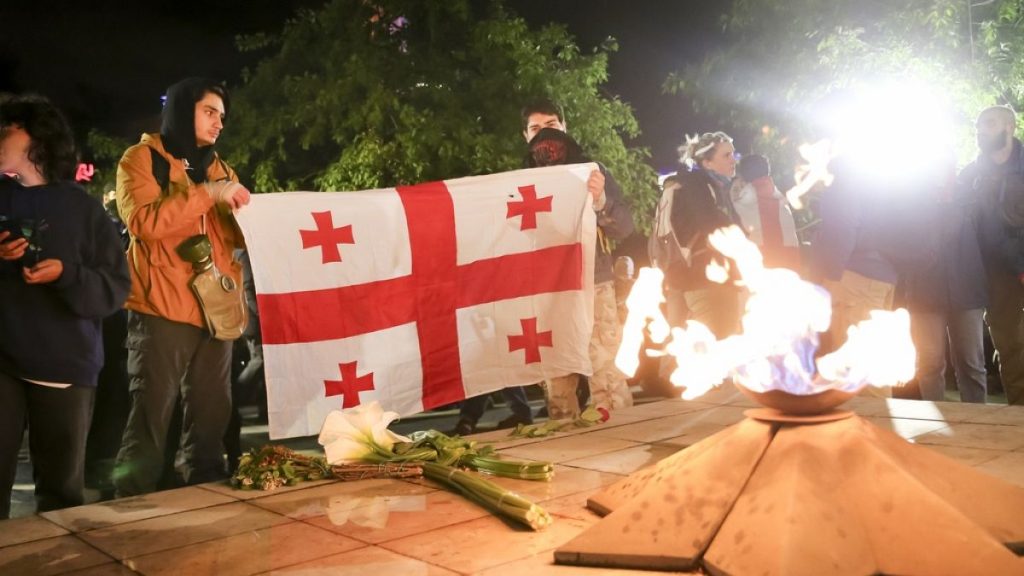Two bills introduced in Washington aim to persuade the Georgian government to abandon a controversial “Russian law” that requires media and NGOs to register as “foreign agents” if they receive over 20% of their funding from abroad. Despite mass protests, the law was recently passed in Georgia. The proposed bills, the “Mobilizing and Enhancing Georgia’s Options for Building Accountability, Resilience and Independence” (MEGOBARI) and the Georgian People’s Act, provide visa liberalisation and opportunities to strengthen US-Georgia relations across various sectors, while also sanctioning those responsible for any potential democratic regression in Georgia. Critics of the law, proposed by the ruling Georgian Dream party, fear it could be misused to suppress media freedom and dissenting voices, similar to how such laws are used in Russia to silence opposition to the Kremlin. The US Secretary of State Antony Blinken has announced visa restrictions against Georgian officials connected to the controversial bill, prompting a response from the Georgian Dream party accusing the US of emotional blackmail and stressing the need for a partnership between the two sovereign states.
The introduction of the two bills in Washington highlights the concern over Georgia’s adoption of a law that mirrors a controversial Russian legislation. The US is making efforts to prevent the Georgian government from implementing this law, which has faced significant opposition from the public. By offering visa liberalisation and opportunities to strengthen US-Georgia relations, while also imposing sanctions on individuals responsible for any potential democratic erosion, the US is sending a strong message to Georgia. Critics fear that the law could be used to suppress media freedom and critical voices in Georgia, similar to how such laws are utilized in Russia to quash opposition to the government. The move by the US government to impose visa restrictions on Georgian officials linked to the controversial bill further underscores its commitment to preserving democratic values and freedom of expression in Georgia.
The backlash from the Georgian Dream party accusing the US of emotional blackmail and emphasizing the need for a partnership between the two sovereign states indicates a strained relationship between the US and Georgia. The Georgian government’s response to the US measures suggests a certain level of defiance and a refusal to yield to external pressure. However, the US remains firm in its stance against the controversial law and is willing to take measures to ensure that democratic values are upheld in Georgia. The proposed bills demonstrate the US government’s commitment to supporting democratic institutions and safeguarding freedom of speech in Georgia, while also pushing for closer ties between the two countries. The tension between the US and Georgia over this issue reflects deeper underlying political and ideological differences that need to be addressed through constructive dialogue and cooperation.
The controversy surrounding the Georgian law and the US response underscores broader geopolitical dynamics at play in the region. Georgia’s strategic location and its relationship with both the US and Russia make it a key player in the ongoing competition for influence in the region. The US is seeking to maintain its influence in Georgia by opposing laws that could undermine democratic values and freedom of expression, while Russia may see an opportunity to exert its influence by supporting such legislation. The conflict over the Georgian law highlights the broader struggle for influence between the US and Russia in the region, with Georgia caught in the middle. The introduction of the two bills in Washington represents a proactive response by the US to safeguard its interests and values in the region, while also sending a message to Russia about its stance on democratic governance and freedom of speech.
The situation in Georgia also reflects the broader challenges facing democratic governance and freedom of expression globally. As authoritarian regimes seek to consolidate power and suppress dissent, democratic countries like the US face increasing pressure to uphold democratic values and support civil society in other countries. The US government’s response to the Georgian law is part of a broader effort to push back against the global trend of authoritarianism and defend democracy and human rights. By taking a stand against the controversial law in Georgia, the US is sending a message to other countries that it will not tolerate actions that undermine democratic values and freedom of expression. The situation in Georgia serves as a microcosm of the larger struggle between authoritarianism and democracy playing out on the global stage, with the US positioning itself as a defender of democratic principles and human rights.
In conclusion, the introduction of the two bills in Washington reflects the US government’s commitment to upholding democratic values and freedom of expression in Georgia. The controversy surrounding the Georgian law and the US response highlights broader geopolitical dynamics at play in the region, with the US seeking to maintain its influence while Russia looks to exert its own. The situation in Georgia also underscores the broader challenges facing democratic governance and freedom of expression globally, with the US taking a stand against authoritarianism and defending democracy and human rights. The tension between the US and Georgia over the controversial law signifies a deeper struggle between authoritarianism and democracy, with the US positioning itself as a defender of democratic principles on the global stage. Through its actions, the US is sending a clear message that it will not tolerate actions that undermine democratic values and freedom of expression, both in Georgia and around the world.


